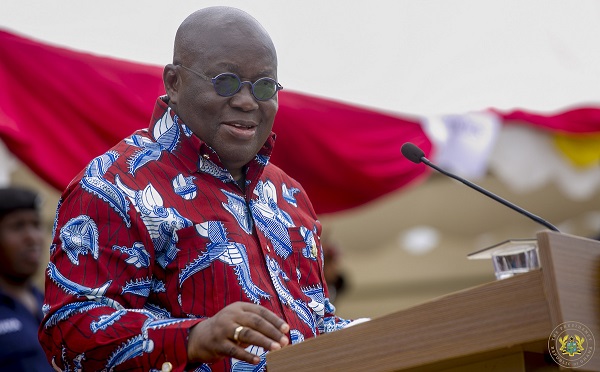
Economic recovery on course— President Akufo-Addo
President Nana Addo Dankwa Akufo-Addo has given an assurance that in spite of the ravaging effects of the COVID-19 pandemic and the Russia-Ukraine war on global economies, his government’s recovery programme is credible enough to return the local economy to its glorious days.
“You'll find that in Ghana the recovery programme that we have is one that is considered very credible and it is what is going to give us the opportunity to come out of this period a stronger economy; it is that future that we are looking at when attracting people,” he said.
Advertisement
President Akufo-Addo gave the assurance in an interview with BBC Focus on Africa’s Peter Okwoche in London last Monday.
Before the interview, the President had launched the Destination Ghana initiative which seeks to attract one million tourists yearly from mainly Europe to Ghana.
Background
The President’s assurance was based on the government’s programmes initiated to bring the economy back on track after the COVID-19 pandemic.
The assurance is based on two key initiatives to provide relief for local businesses.
The first, which was introduced immediately after the COVID-19 crisis, is the Coronavirus Alleviation Programme - Business Support Scheme (CAP-BuSS), which provided grants of up to GH¢600 million to support micro, small and medium enterprises (MSMEs).
The other intervention is the GH¢100 billion COVID-19 Alleviation and Revitalisation of Enterprises Support (CARES) programme aimed at mitigating the impact of the pandemic on the lives and livelihoods of Ghanaians.
It is also to ensure that Ghanaians quickly emerge from the pandemic with a stronger and more resilient economy.
Effect
Asked what had gone wrong for one of the fastest growing economies in the world to experience such devastation, President Akufo-Addo explained that Ghana’s situation was like that of all countries of the world which had been badly affected by happenings of the last two years.
He explained that since he assumed office, the economy had recorded an average growth rate of seven per cent from 2017 to the beginning of 2020.
“One of the fastest growing economies in the world was the Ghanaian economy, even in the crunchy 2020 when the economies of the world nosedived,” he said.
Provocative
President Akufo-Addo said even in the embers of the COVID-19 pandemic, Ghana managed to attain positive rates of growth because the fundamentals of the economy were strong.
He, however, agreed that it had been a difficult task for all economies of the world.
“The world economy as a whole has gone through very difficult times,” he told the BBC.
The President noted that there were many things that the government was doing to ensure that the economy picked up and expressed optimism that “next year if you come and speak to me as you're doing today, we’ll be having a different set of facts for us to look at”.
The BBC host presented claims that people in the hospitality industry in Ghana were being laid off, that there were threats of strike by taxi drivers because of fuel price hikes and that Ghana did not look like a place where investors would be attracted to.
“Where will you put your money in the world today: Britain, which is suffering the worst standard of living statistics for over 30 years?” President Akufo-Addo asked rhetorically.
“Let us situate ourselves correctly. The world is going through very difficult times, and Ghana is no exception; Nigeria is no exception. There's no country in the world that is escaping the ravages of both the COVID-19 and the impact of the Russian invasion of Ukraine.
“What you need to look at is: where are the elements being put on the ground that look beyond the COVID-19 and beyond the Russia-Ukraine war,” the President posited.
E-Levy
Explaining the rationale behind the Electronic Transfer Levy (E-Levy) Act, President Akufo-Addo indicated that the digital economy was emerging as the biggest one in the country, but for a long period it had not been taxed.
Therefore, he said, it was important that it was brought under the tax net.
He added that Ghana had one of the lowest tax to Gross Domestic Product (GDP) ratios in West Africa, which had a general average of tax-to-GDP of about 18 per cent, with Ghana having 13 per cent.
The President, therefore, debunked claims that Ghana was overtaxed, saying: “If anything at all, it is under-taxed.”
Expert
When the interviewer quoted an economic expert at the Institute of Economic Affairs who suggested that the E-Levy was not necessary because other measures, such as the passage of the Tax Exemption Bill, could have taken care of that, President Akufo-Addo indicated that there were tax experts in his government who believed strongly that the tax was necessary.
He discounted claims that the E-Levy would be double-taxing Ghanaians, including the impoverished, and explained that the tax was about taxing an industry where a lot of value was being created to bring that value into government coffers.
“It is not only Ghana that is having a digital tax; many many countries have it,” the President stated.
He indicated that people naturally did not want to pay tax and, therefore, would object to it, saying: “I don't know anybody or any group of people, especially those in business, who, when they are asked to pay taxes, would like it.”



